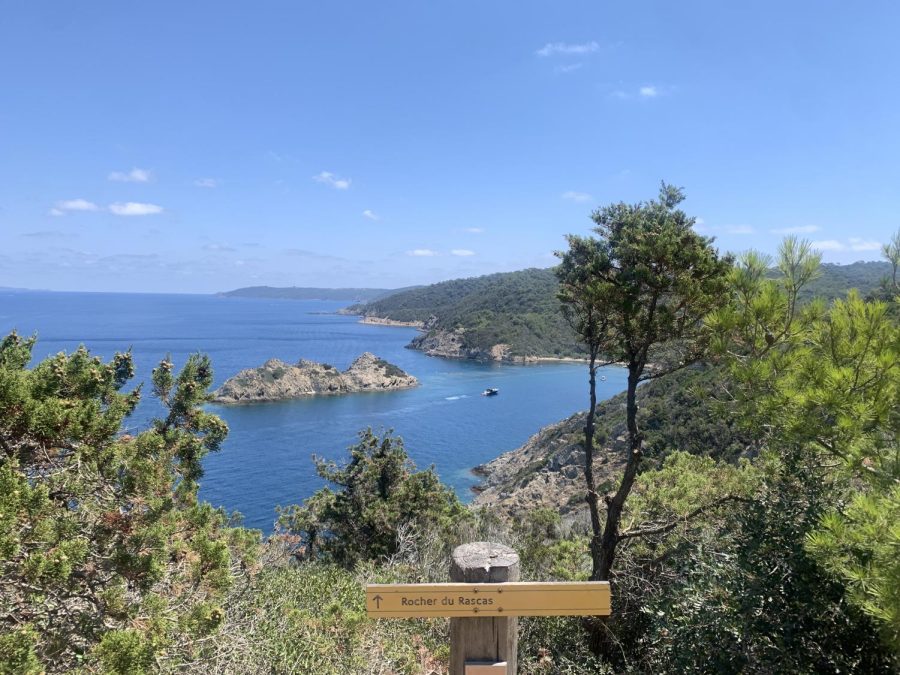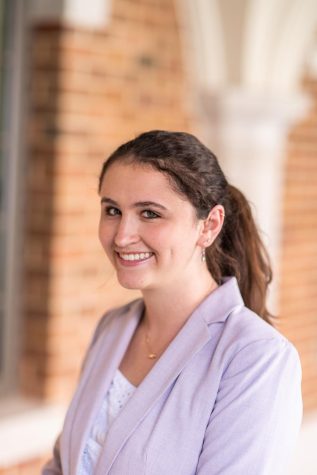As a kid, I used to decorate my bike for our neighborhood’s Fourth of July parade, mindlessly tying streamers to the handlebars and haphazardly applying my sister’s American flag face paint. Yet, I had no idea the meaning behind the red, white, and blue or the flags I saw everyone carrying. The date “July 4, 1776” was ingrained in my memory without my noticing, and I recited the Pledge of Allegiance each morning without a thought to the words leaving my mouth. I knew I was an “American,” but I didn’t feel this identity on a day-to-day basis as I was surrounded by people who shared it.
That all changed last summer when my name became “la jeune fille au pair américaine” (the young American au-pair girl). I constantly overheard this phrase in reference to me, and I don’t believe it was used in place of my name to be disrespectful; rather, my nationality and occupation were my key identifiers in others’ minds.
The first time I really felt the weight of my American identity was when I lived outside of it. Living in a country that did not match my nationality, I became hyper-aware of it.
National identity is, in many ways, not an identity people carry visibly; rather, it is ingrained in the perspective someone brings to the table and the reality they first come to understand.
I spent three months as an au pair in Giens, a small village in southern France, where I lived in a hotel built in the 1950s that has been in my host parent’s family for the past three generations. Through hallway interactions with the receptionists, laundry room small talk with the cleaning staff and elevator chats with the chefs, I found I was always perceived by my nationality first. I was asked questions about if we actually eat a full turkey presented on its own platter on Thanksgiving.
People asked me to pronounce things they couldn’t in English, just as I leaned on them to improve my French. I was asked what I thought about Joe Biden’s age and Donald Trump’s presidency. When people heard me speaking in English with my host mom, I was told that with my accent, I must be from Boston. I was asked by another if, considering the way I dress, I was from Texas. I’m from Colorado.
At first, it was difficult to get past the language barrier. But after spending months with people my own age, we were able to help each other improve our language skills and discover books and TV shows we all loved. Their questions about American obesity, cars and other stereotypes also helped me realize the day-to-day aspects of my life I normally skim over. I also was able to shine a light on aspects of their life they hadn’t noticed were unique to where they live.
A prime example of this was the presence of an ashtray on every table—cafés and fancy restaurants alike—and the omnipresent cigarette smoking that accompanied them. My French friends were shocked to learn it is not habitual to smoke while eating a meal in a restaurant in the U.S and that our cigarette packs aren’t covered in horrendous medical images and warning labels like theirs.
When people became more comfortable with me, they also asked me about racism in America and told me that news of George Floyd’s murder spread to their town as well. I was in France during the school shooting in Uvalde, Texas, and noticed that the headlines in France focused on American gun laws and shootings, pointing to them as examples of what they work to prevent. Seeing these papers, I felt American.
I also felt American in certain interactions with my host kids, two four-year-olds and a 10-month-old baby. Before my arrival, their mother explained to them that an American was coming to take care of them and that I speak English as my first language. Through interactions with them, I realized that, while nationality is something we are born into, it is not a concept we are born understanding. While the kids could understand bits of English, they would only respond to me in French. On occasion, I would try to speak to them in English and they would eventually notice and ask what language I was speaking or get frustrated and ask me to stop. They asked me why I was speaking it, and I struggled to explain that it’s because I am from another country where it is spoken. They eventually recognized when I was speaking what language, and asked me how to say things in “my language” and would ask their parents, fluent English speakers, for new words as well.

When I showed them pictures of my family and my pets, they asked me why they couldn’t meet my mom and my cats or see my house. I showed them maps on my phone, but they were met with blank stares. When I told them that I had to leave at the end of the summer to go back to school, they asked why I couldn’t go to a school near them. After a while they seemed to grasp that I live far away from them, and that they would have to take an airplane to visit me. But that is as far as their understanding of nationality goes.
Shunnar Virani, a sophomore at Vanderbilt who is a magazine staff writer at The Hustler, holds dual American and Pakistani citizenship. Virani said his feelings of national identity are influenced by physical location: He was born in Texas but lived in Pakistan from 5 months to 12 years old. He received his primary education in Pakistan before moving to America halfway through seventh grade.
While he grew up outside of the U.S., he was aware of his identity as an American long before I was. He remembers the weight of being an American was constantly felt through adolescence. His parents painted idealistic images of America and explained to him that “the plan” was always to move back to the U.S. when they got their visas.
“I knew I was American and I knew we were going to go back to America one day,” he remembers. “That was just something that was always apparent.”
On January 12, 2016, he and his family arrived in the U.S. and have lived in Dallas, Texas ever since.
“You’ve been looking forward to that American dream your entire life. You’ve been told that you are going to go to a place that was just inherently better—where the streets were cleaner, where the bridges didn’t have holes and the roads had lanes, where people actually obeyed traffic laws and the education system was a very crucial aspect of society,” Virani said about the idea he had of America before arriving again.
In coming to America, however, beyond realizing his identity as an American, he became much more aware of his identity as a Pakistani. He said the small things, like having multiple choices of candy at a gas station, made him aware that his day-to-day norms as a Pakistani give him a fundamentally different perspective.
“You want to be able to embrace the good aspects of your culture and be true to it, and you realize when you are surrounded by a different culture you start to think about the minute differences that you might not have paid attention to when you are in a group of similar people,” Virani said.
Beyond gas station candy, Virani reflects that one thing that surprised him about coming to the U.S. was the absence of Islam as a core school subject. He said he anticipated Urdu to be missing, but next to core subjects like English, Math, Science and Social Studies, he anticipated Islam to be included, as it was so normalized in Pakistan.
Another aspect of his Pakistani identity that he became more aware of in the U.S. was his first name. In Pakistan, people commented that it is a Western name, but in America, he gets the opposite response.
“When I lived in Pakistan people used to often say ‘Well this is a Western name. It’s an American name’ and then I come here and a lot of the time people will have the impression that it’s maybe a foreign name or an Arabic name,” Virani said. “It’s actually an Arabic name with a Western twist, so it’s both.”
National identity is, in many ways, not an identity people carry visibly; rather, it is ingrained in the perspective someone brings to the table and the reality they first come to understand. And oftentimes, it is only something that is felt outside one’s nation.
This article was previously published in Kidizenship: Watch Us Rise and includes an interview with a magazine staff writer of The Hustler.













